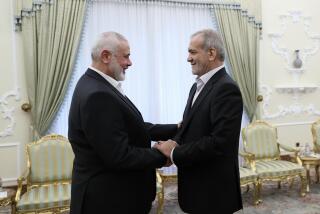Ahmadinejad rival elected to key post
BEIRUT — A powerful rival to Iranian President Mahmoud Ahmadinejad was elected speaker of parliament Wednesday, clearing the way for a potential challenge to the hard-line head of state before 2009 presidential elections.
Ali Larijani, Iran’s well-connected former chief nuclear negotiator, made it immediately clear that he would play a broad role in vital matters usually dominated by Ahmadinejad. While reaffirming Tehran’s hard-line stance on its nuclear program, which has drawn international criticism, he pledged that parliament would play an active role in shaping Iran’s defense of the controversial effort.
“A mysterious diplomatic give-and-take is underway between the U.S. and the U.N. nuclear agency to bring baseless allegations against Iran,” he told members of the parliament, or Majlis, according to the Islamic Republic News Agency. If such pressures continue, he said, the parliament “will intervene in the case and set a new line for cooperation” with international arms inspectors.
The United Nations Security Council has demanded that oil- and gas-rich Iran halt its drive to master the enrichment of uranium, suspecting that it is the cornerstone for a future nuclear weapons program.
Iran’s unique political system blends elements of a clerical dictatorship and a democratic republic. Supreme leader Ayatollah Ali Khamenei sits atop a government that features presidential and parliamentary elections in which candidates loyal to the regime may compete.
Larijani won 232 of 263 votes cast to beat out incumbent Speaker Gholam Ali Haddad Adel, who rarely challenged Ahmadinejad. Larijani’s ascent signals hostility to the president among the new batch of mostly conservative lawmakers voted into office in March parliamentary elections, analysts said.
Enmity between the president and the new speaker runs deep. The two men were candidates for president in 2005, with Ahmadinejad winning the post. As Iran’s nuclear negotiator, Larijani chafed against Ahmadinejad’s belligerent international tone, which he complained undermined his talks with European leaders and international arms inspectors.
This week the International Atomic Energy Agency issued a report that took Iran to task for failing to clear up questions about missile design plans, explosions testing and uranium experiments it allegedly carried out until 2003.
Many analysts said the differences between Larijani and Ahmadinejad have more to do with style than substance. Larijani, who won his parliamentary seat as a representative of the Shiite Muslim shrine city of Qom, is from an elite religious family. Ahmadinejad is a blacksmith’s son who fought as a member of the Islamic Revolutionary Guard in the 1980-88 Iran-Iraq war.
European diplomats who have dealt with Larijani said he was far better informed and more flexible than Ahmadinejad loyalists. He also appears to have Khamenei’s ear. When Larijani quit as Iran’s chief nuclear negotiator late last year over disagreements with Ahmadinejad, the supreme leader’s office intervened to have him stay on for a transition period.
“Although Larijani certainly is not soft on the West, he is much more pragmatic than Ahmadinejad,” said Mark Gasiorowski, a professor of Middle East studies at Louisiana State University. “I think we can score this vote as a step toward more pragmatic leadership in Iran’s foreign policy.”
Still others cautioned not to overestimate the power of either Larijani or Ahmadinejad with regard to crucial matters such as Iran’s nuclear program or alleged support for allies across the Middle East.
“There will not be an iota of change in Iranian foreign policies in Lebanon and Iraq, because these policies are decided under the auspices of the supreme leader by the experts in these fields,” said Aziz Shahmohammadi, director of the English-language pro-government newspaper Iran Daily.
Tensions between Ahmadinejad loyalists and more pragmatic conservatives such as Larijani probably will reach a boiling point before the June 2009 presidential elections, especially over the Iranian economy, analysts said.
Many in Iran’s ruling circle have denounced Ahmadinejad’s populist rhetoric and economic policies, which have failed to create jobs despite record oil and gas prices. He has forced banks to lower interest rates, spurring record inflation that has hurt Iranian consumers.
Iran watchers speak of a conservative anti-Ahmadinejad alliance that includes Larijani and Tehran Mayor Mohammed Baqer Qalibaf, who also ran against Ahmadinejad in 2005.
“If the Larijani-Qalibaf alliance holds and Larijani uses his position as speaker to attack Ahmadinejad on behalf of Qalibaf, they would pose a formidable challenge to Ahmadinejad,” Gasiorowski said.
--
Special correspondent Ramin Mostaghim in Tehran contributed to this report.
More to Read
Sign up for Essential California
The most important California stories and recommendations in your inbox every morning.
You may occasionally receive promotional content from the Los Angeles Times.










